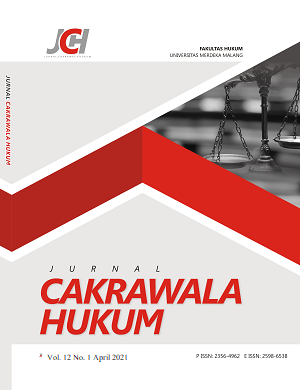Perlindungan terhadap inventor terkait unsur kebaruan paten yang hapus akibat tidak membayar biaya tahunan
DOI:
https://doi.org/10.26905/idjch.v12i1.4717Keywords:
Patents, Novelties, Inventions, Inventors, Patent Annual Fees.Abstract
The elimination of a registered patent causes the inventor's exclusive right to use his invention to be lost, it causes losses to the inventor as a result of not being able to reuse the invention. In addition, the inventor also loses economic rights to the patent because he cannot use his invention. The regulation regarding the abolition of patents stipulated in Article 130 letter d of the Patent Law is deemed not to provide adequate protection for inventors. Based on this, the aim of this research is to determine the legal qualifications of the Patents Directorate's actions in consuming registered patents and to determine the legal actions that should be taken by inventors to get their patents back. In research, the method used is normative juridical, and descriptive-analytical research specifications. The aim is to analyze the prevailing laws and regulations and legal theory with practical implementation in reality. Data were collected through literature and field studies, then analyzed using qualitative normative methods. The final result of the research states that the elimination of patents is due to not paying annual fees and making the patent into the public domain as in Article 130 letter d of the Patent Law is against the Alter Ego Principle because the elimination of the patent makes the patent turn into the public domain and shows that the patent has lost its novelty element.
How to cite item: Ramadhani, M., Amirulloh, M., & Faisal, P. (2021). Perlindungan terhadap inventor terkait unsur kebaruan paten yang hapus akibat tidak membayar biaya tahunan. Jurnal Cakrawala Hukum, 12(1).51-59. doi:10.26905/idjch.v12i1.4717.
Â
Downloads
References
Amirulloh, Muhamad et. al. 2016. Buku Ajar Hukum Kekayaan Intelektual. Cet. 1. Unpad Press. Bandung.
Ganindha, R., & Sukarmi, S. 2020. Peran pemerintah daerah dalam mendukung potensi indikiasi geografis produk pertanian. Jurnal Cakrawala Hukum, 11(2), 211-221. doi:10.26905/idjch.v11i2.3970.
Hendrix, Tommy. 2019. Pemanfaatan Paten Public Domain untuk Daya Saing Industri (Studi Paten Pupuk Organik). Jurnal Ilmiah Manajemen Forkamma, Vol. 3, No. 1.
Mahardhita, Yoga. 2018. Perlindungan Hukum Hak Kekayaan Intelektual Melalui Mekanisme “Cross Border Measureâ€. Jurnal Ilmiah Ilmu Hukumm QISTIE, Vol. 11 No. 1 Mei.
Mardiana, H., Amirulloh, M., & Faisal, P. 2020. Hak paten sebagai objek jaminan fidusia berdasarkan peraturan perundang-undangan mengenai jaminan fidusia dan paten. Jurnal Cakrawala Hukum, 11(2), 177-186. doi:10.26905/idjch.v11i2.4094.
Mayana, Ranti Fauza. 2004. Perlindungan Desain Industri di Indonesia Dalam Era Perdagangan Bebas. Gramedia Widia Sarana Indonesia. Jakarta.
Nurfitri, Dian & Rani Nuradi. 2013. Pengantar Hukum Paten Indonesia. Alumni. Jakarta.
Saidin, OK. 2010. Aspek Hukum Hak Kekayaan Intelektual. Rara Grafindo Persada. Jakarta.
Soeroso, R. 2011. Pengantar Ilmu Hukum. Sinar Grafika. Jakarta.
Subroto, Muhammad Ahkam. 2005. Eksplorasi Konsep Kekayaan Intelektual Untuk Penumbuhan Inovasi. LIPI Press. Jakarta.
Syahmin, AK. 2007. Hukum Dagang Internasional: Dalam Kerangka Studi Analitis. Raja Grafindo Persada. Jakarta.
Lindsey, Tim., et. al. 2013. Hak Kekayaan Intelektual. Alumni. Bandung.
Additional Files
Published
How to Cite
Issue
Section
License
Copyright (c) 2021 Jurnal Cakrawala Hukum

This work is licensed under a Creative Commons Attribution-ShareAlike 4.0 International License.
Authors who publish in this journal agree to the following terms:
The copyright of the received article shall be assigned to the journal as the publisher of the journal. The intended copyright includes the right to publish the article in various forms (including reprints). The journal maintains the publishing rights to the published articles. Authors must agree to the copyright transfer agreement by checking the Copyright Notice column at the initial stage when submitting the article.










